Search Results
Fine Jewelry University Articles matching: “Simple diamond ring”
Showing only FJU Article results. Click here to show all results.
Fine Jewelry University (Show All FJU Articles)
-
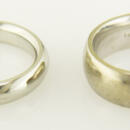
The Difference Between White Gold and Platinum
… its karat. The key to understanding gold karat is the karat value over 24. An example is a 14-karat gold wedding ring. It is 14/24, which equals 58.3% gold and 41.7% alloy. The white color is achieved by a careful choice of the alloying … because if you don’t like the light yellow look of a specific manufacture, then don’t buy it. New white gold rings are usually coated with a hard protective finish of rhodium, a silver-white metal like platinum. The rhodium plating is …
-
Synthetic Gems: The Whole Story
… to plastic to high tech chemical tongue twister like gadolinium gallium garnet (also called GGG) and the modern diamond simulant Moissanite, a man made silicon carbide. In gemology, any material used to look like a gem is called a simulant… clear glass, rock quartz, GGG, and Moissanite are all diamond simulants. They look like diamonds, but they are not diamonds. These simulants are easy for a well trained and equipped gemologist to detect. But if you had gem material that is …
-
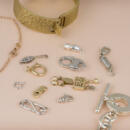
Types of Jewelry Clasps
…changing needs and preferences of different cultures and styles. One of the earliest forms of jewelry clasps was the simple hook-and-eye clasp which was used by ancient Egyptians and is the oldest known clasp style. This type of clasp was … development of new metalworking techniques and machinery led to the mass production of jewelry, and the demand for simpler, more affordable clasps grew. This led to the development of the spring ring clasp, which is still widely used today…
-
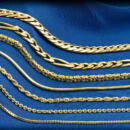
Types of Necklace Chains
… one of the most durable chain designs there is. Each twist on these chains reflects light easily and when they are diamond cut they are extremely sparkly. Although most chain styles can come in a hollow link version, for rope chains, hollow…. The woven and filigree style of this chain will often have a light, airy feel. These chains will be often be diamond cut which gives them an even more lively and glittering appearance. Diamond cutting on a chain means there are small …
-
Caring for and Cleaning Your Jewelry
How to Clean Jewelry A diamond‘s spectacular beauty is due to its light show. Diamonds make light reflect, show its many colors, and dazzle. To … and lotions add a coating that stops the light show. Dust and dirt stick to the grease and oils creating a lifeless diamond. Cleaning your diamond jewelry at home is simple and rewarding. Use a soft toothbrush and mild soap then rinse … key to diamond cleaning is the underneath side or pavilion. The light needs a clean surface to bounce upward. The diamond may need to be scrubbed several times before all the build up is removed. Some don’ts of jewelry cleaning. Never use …
-
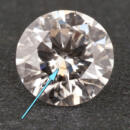
What Are Lab Grown Diamonds?
In the simplest terms, lab grown diamonds are diamonds that have been made by people instead of mined out of the earth. If it’s so simple, you might wonder …this sentence. The complexity arises from the fact that lots of different terms have been used to describe lab grown diamonds and their cousins, and not everyone uses these terms in the same way. So, let’s begin with some vocabulary. … mean man-made, copied, unreal, or even imitation. But, in this context, what do we mean when we say “synthetic diamond”? In the gemological world, synthetic is a highly technical term. When speaking technically, synthetic gems are man-made …
-
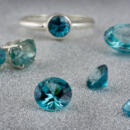
Gem in the Spotlight: Blue Zircon
… of zircon creates one of the liveliest displays found in any colored gem. In fact, before any of the manmade diamond simulates were made, the colorless version of zircon was used in jewelry to mimic diamond. Why? Natural zircon is known for…, brown, or red variety of Zircon. Jargon is the colorless, pale gray, or pale yellow variety of Zircon. Matura Diamond is another trade name for colorless Zircon. Starlite is the name for the blue gem variety of Zircon. The color of …
-

How Are Lab Grown Diamonds Made?
The dream of making a beautiful and valuable diamond from simple carbon has long captivated the imagination of scientists and visionaries alike. Just like the alchemists…, many have tried to achieve this impressive feat. We have only recently been able to produce gem quality, lab grown diamonds that are large enough to be used in jewelry. But, how is it done? Early Efforts Throughout history, many people …. Henri Moissan was one of the early pioneers in the field. In 1893, he claimed to have successfully made a diamond by heating charcoal to 3,500 degrees Celsius inside a carbon crucible. Many attempts were made to reproduce his techniques …
-
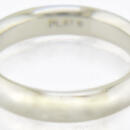
Platinum
…white luster, have made platinum an increasingly popular choice for jewelry, either on its own or as the setting for diamonds and other precious gemstones. Platinum jewelry does not fade or tarnish and keeps its looks for a lifetime. …the strongest and most enduring metals. Some of the world’s greatest treasures are set in platinum, such as the Hope Diamond. It is also one of the heaviest, weighing 60% more than gold. The word platinum sometimes enjoys a cachet higher …